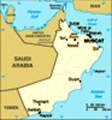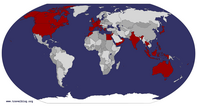Advertisement
Published: June 23rd 2019
Today we have booked a full day tour to the Wahiba Sands and Wadi Bani Khalid, both of which are around 200 kms south-east of Muscat.
Our guide for the day introduces himself as Ahmed, and we head out of town on yet another immaculate six lane highway. We comment to Ahmed on how great we think the roads are here, and he tells us that when the current Sultan came to power in 1970 there were only seven kilometres of sealed roads in the entire country. The previous Sultan, the current Sultan’s father, was very much against development, and was determined to keep Oman isolated from the rest of the world. No one has ever been quite sure why he chose to do this. What has happened since 1970 seems little short of an economic miracle, with development of oil reserves generating massive revenue which has been used to develop world class road and other infrastructure, and to deliver vast improvements in education, health and welfare.
The scenery along the road is stunning, with steep, bare, rocky mountains all around us. We cross the occasional bridge across very wide dry river beds fringed with date palms. These rivers
must occasionally flow full, which seems unimaginable in the parched landscape.
We pass a roadside stall where Ahmed says they are selling dried baby shark. This used to be very cheap until someone found out that it had some viagra-like properties, and the price then skyrocketed to the extent that a lot of people can no longer afford it.
We reach the last town before the Wahiba Sands, and stop at a service station where Ahmed gets the attendant to let some of the air out of our tyres, presumably to make it a bit easier for him to drive through the dunes. Issy assumes we are here for a toilet break, and as she goes to open her door she narrowly avoids knocking the attendant out. He doesn’t look overly impressed.
We head off into the desert wilderness. First stop is a Bedouin camp. Ahmed tells us that the Bedouins no longer live out here during the summer months. Their summer homes are in the villages and they only come out here occasionally at this time of the year to tend to their camels. The camp buildings comprise a large communal room adjoining a private living
room. The communal room is adorned with trinkets which the Bedouins sell to tourists during the peak winter season, and a worryingly large number of skeletons. Ahmed assures us that they are camel skeletons, but the message is clear - that will be us if we get stranded out here in what is clearly a very remote and inhospitable environment.
Whilst some of the Bedouin’s camels are tied up or secured in wired enclosures, others are roaming free. I hope they’re friendly. We asked our doctor before we left home whether we should get rabies injections, and she responded by asking us whether we were planning to put our hands in the mouths of any camels. I’m not quite sure why she thought this was more likely than one of us getting an unplanned bite from a rogue camel, but she’s a doctor and we’re not, so we thought better of questioning her logic. Camels are clearly an important commodity out here. Ahmed tells us that racing camels can sell for more than a million dollars, and slow camels are an important source of milk and meat.
We leave the camp, and Ahmed advises us that we will
now head deeper into the wilderness to do some “dune bashing”. The dunes are spectacular. They are precipitously steep and up to two hundred metres high in places. “Dune bashing” seems to involve driving through the dunes as fast as you can while getting as close as possible to rolling or flipping the car without actually doing so. The primary aim of this appears to be to scare the living daylights out of the passengers. Ahmed seems to be a master dune basher. We see the occasional abandoned tyre sitting embedded in the sand which doesn’t do a lot to settle my nerves, although Issy seems to be quite enjoying the experience. Ahmed then goes on to tell us that hundreds of locals race their cars through the dunes here every weekend, and fatalities are almost routine. Any enthusiasm I might have had for dune bashing has now evaporated. The scenery is stunning nonetheless.
We leave the dunes and head off into the mountains towards the wadi. We pass lots of roadworks, and Ahmed waves to acknowledge a man standing on the side of the road holding a red flag to caution the traffic. As we pass him we
see that he’s not really a man at all, but rather a dummy carefully disguised as a road worker. It’s certainly scorchingly hot, and if it was my job to stand on the side of the road for hours at a time in the blazing sun waving a flag at passing motorists I think I might be tempted to delegate this job to a dummy too.
Issy is a bit prone to travel sickness, and before we left home she bought a pair of glasses which the manufacturers claimed would cure her of this. They consist of four circular frames, one at the front and side of each eye, half filled with a blue fluid. There are no lenses. The theory seems to be that the fluid stays level while the car or boat you’re in moves, and this then tricks your eyes and brain into thinking that you’re not really moving at all. When she wears them she looks a lot like Elton John. Ahmed sees her wearing them in his mirror and can’t stop laughing. I think he already thought we we’re crazy for coming to Oman in the hot season, and one look at Issy’s glasses
seems to have erased any previous doubts he might have had.
The wadi is stunning. A small dam has been built across it to create a large deep pool surrounded by date palms. Ahmed tells us that the small fish we see swimming around in the shallows near the edge are the same fish that tourists pay lots of money to have chew dead skin off their feet in places like Bali; here you get this treatment for free. Issy asked me before we left the hotel this morning whether she would be allowed to swim here in her bikini, and I assured her that it would be fine. I think I might be in trouble. Ahmed tells us that a lot of the locals have been complaining recently about tourists offending local sensitivities by swimming here in skimpy swimwear. This has resulted in the introduction of new rules requiring women swimming here to cover up from knee to elbow. Issy didn’t think to pack a burkini when we left Australia, so she has to swim in her knee length denim shorts and a tee shirt. I hope she doesn’t sink. Ahmed leaves us to swim while he goes
off to pray. The water and its surrounds are idyllic.
Ahmed points out some flood debris marks about two metres above our heads along the path to the wadi, and tells us that an Indian family of six was killed here last month when a flood came through. It wasn’t raining here at the time so they didn’t recognise the risk; the flood was generated by a severe storm in the mountains upstream. It’s hard to believe that floodwaters could be so deep here, particularly in such a dry climate. Ahmed tells us that lots of people are killed in Oman every year when the cars they are in get swept away while trying to drive through flooded wadis, and on the drive out he shows us the remains of a car, in which all the inhabitants were killed, lying upside down in another wadi.
We stop for lunch at an Indian restaurant in a village near the wadi. Ahmed has noticed Issy dozing off in the back seat of his car, and tells her that she has “sleepy eyes”. He says that they are very sexy, and tells me that I am a very lucky man. I
think I might need to keep a closer eye on him from now on.
Ahmed asks us how we met, and the conversation moves on to how couples get together in Oman. He says that this is usually arranged by the parents, and couples are not permitted any contact, even by phone, until after they become engaged. He says that after that they are allowed to ring each other, and to sit and talk to each other at home provided someone else is present. I get the impression that he’s not too convinced that this is such a great system, as the couples don’t really get to know each other before tying the knot. He says that he’s divorced and has since remarried. He says he’s only got one wife, but legally he’s allowed up to four. He says this can get very expensive and complicated, as Islam requires husbands with multiple wives to treat them all the same. For example, if a husband buys a new car for one wife, he has to buy one for all of them. He says it’s rare for men to have more than two wives, mostly because they can’t afford it. I
think I’d be more worried about trying to keep the peace.
On the drive back to Muscat, Issy comments on how immaculate and uniform all the houses here look. Ahmed tells us that the government has mandated that Omani houses can only be painted in one of three beige/cream colours, and if the exterior paintwork starts to get a bit shoddy you get fined. That sounds like an excellent incentive to keep on top of your home maintenance. Everything seems to be immaculately clean here. There’s very little rubbish and we haven’t seen any graffiti. We pass a man whose job seems to be to sweep the street by hand, and we saw another man scrubbing the tiles on the promenade footpath when we were in Mutrah last night.
We bid our farewells to Ahmed. He’s been a very knowledgeable and informative guide, and he’s given us some great insights into everyday Omani life. I think I may have even started to forgive him for trying to kill us out in the dunes, and for flirting with Issy. Now that I think of it, I wonder whether it was only me he was trying to kill. We agree
that today’s tour has been a real highlight.
Advertisement
Tot: 0.072s; Tpl: 0.014s; cc: 14; qc: 29; dbt: 0.0416s; 1; m:domysql w:travelblog (10.17.0.13); sld: 1;
; mem: 1.1mb















D MJ Binkley
Dave and Merry Jo Binkley
Laid back
Relaxed.